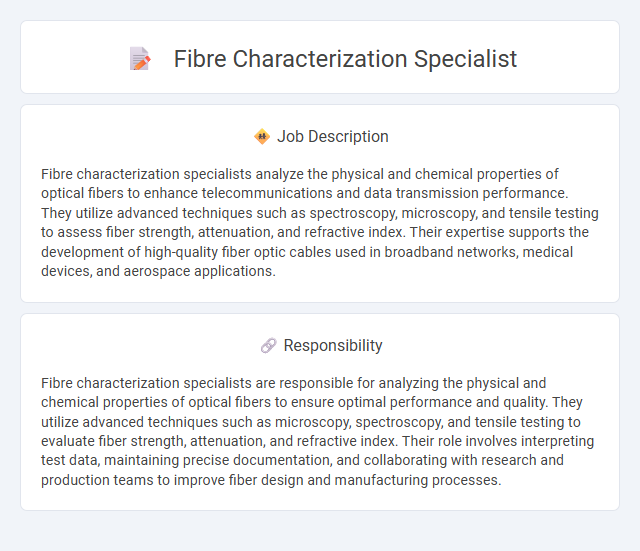
Fibre characterization specialists analyze the physical and chemical properties of optical fibers to enhance telecommunications and data transmission performance. They utilize advanced techniques such as spectroscopy, microscopy, and tensile testing to assess fiber strength, attenuation, and refractive index. Their expertise supports the development of high-quality fiber optic cables used in broadband networks, medical devices, and aerospace applications.
Individuals with strong attention to detail and a background in material science or engineering are likely to be suitable for a Fibre Characterization Specialist role due to the precision required in analyzing fiber properties. Those comfortable working with advanced analytical equipment and interpreting complex data may find this job aligns with their skills and cognitive preferences. Candidates who thrive in methodical, laboratory-based environments with consistent routines have a higher probability of success and job satisfaction in this specialized position.
Qualification
A Fibre Characterization Specialist typically requires a degree in materials science, physics, or chemical engineering, with expertise in fiber optics or textile technology. Proficiency in advanced microscopy, spectroscopy, and mechanical testing methods is essential for analyzing fiber properties such as tensile strength, flexibility, and optical performance. Experience with industry-standard characterization tools like scanning electron microscopes (SEM) and optical spectrum analyzers enhances the ability to ensure high-quality fiber production and research.
Responsibility
Fibre characterization specialists are responsible for analyzing the physical and chemical properties of optical fibers to ensure optimal performance and quality. They utilize advanced techniques such as microscopy, spectroscopy, and tensile testing to evaluate fiber strength, attenuation, and refractive index. Their role involves interpreting test data, maintaining precise documentation, and collaborating with research and production teams to improve fiber design and manufacturing processes.
Benefit
A Fibre Characterization Specialist likely enjoys significant benefits from their expertise in analyzing fiber properties, which can enhance product quality and innovation in industries like telecommunications and textiles. Their role probably offers opportunities for career advancement due to the growing demand for advanced fiber technologies. High job stability and competitive compensation might also be expected as organizations increasingly rely on precise fiber analysis to maintain market competitiveness.
Challenge
Fibre characterization specialists likely face challenges involving precise measurement of fiber properties under varying environmental conditions, requiring meticulous attention to detail and advanced analytical techniques. The complexity of interpreting data from multiple characterization methods may demand continuous learning and adaptation to new technologies. Problem-solving skills are probably essential to address inconsistencies and improve fiber performance in diverse applications.
Career Advancement
Fibre characterization specialists play a crucial role in analyzing optical fibers to ensure performance and reliability in telecommunications and medical devices. Expertise in advanced microscopy, spectral analysis, and material assessment opens opportunities for leadership roles in research and development or quality assurance departments. Continuous skills enhancement in emerging fiber technologies and standards can accelerate career advancement toward senior engineering or technical management positions.
 kuljobs.com
kuljobs.com